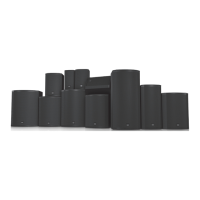7. Equalisation
VX Series Operation Manual rev 3.0.0
9
7. Equalisation
VX Series loudspeakers require no equalisation or correction to overcome system limitations; equalisation
is necessary only to compensate for difcult acoustic environments. Over-equalisation can reduce system
headroom and introduce phase distortion, resulting in degraded sound. If equalisation is required, it should
be applied gently and smoothly. Because VX Series loudspeakers are point source, phase coherent designs,
excessive equalization usually proves detrimental to the overall sound quality.
When one loudspeaker is used in close proximity to another, comb ltering effects can create coverage problems.
(Comb ltering creates an uneven frequency response across the coverage area due to constructive and
destructive interference effects between the two sources.) Comb ltering cannot be cured by equalisation;
this should be addressed with proper arraying as discussed in the following section.
8. Arraying
Small alterations to loudspeaker positions can have the effect of minimising problematic combing frequencies.
Arrays should be constructed so that the individual coverage patters of each loudspeaker combine with
minimal overlap. The design of the VXP cabinet greatly simplies the creation of effective arrays, allowing
seamless wide horizontal coverage using two loudspeakers without the need for tedious experimentation.
By placing the VXP cabinets with the 30 degree angled rear panels together, minimal dispersion pattern
overlap is achieved, guaranteeing an extraordinarily smooth transition. In many applications the 90 or 75
degree dispersion pattern may be sufcient in the horizontal plane. It is also possible to stack the cabinets
vertically using the above method (in a central cluster for example) where greater vertical dispersion is required.
As shown in the above diagram, one of the VXP cabinets is inverted to allow the optimum splay angle to be
achieved. The grille can be simply removed from this cabinet and be replaced for matching orientation. The
grille is held in position by the two xing screws on the top and bottom lips of the cabinet.

